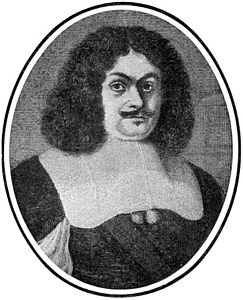Es ist alles eitel
Andreas Gryphius 1616 (Głogów) – 1664 (Głogów)
Du siehst, wohin du siehst, nur Eitelkeit auf Erden.
Was dieser heute baut, reißt jener morgen ein;
Wo jetzund Städte stehn, wird eine Wiese sein,
Auf der ein Schäferskind wird spielen mit den Herden;
Was jetzund prächtig blüht, soll bald zertreten werden;
Was jetzt so pocht und trotzt, ist morgen Asch und Bein;
Nichts ist, das ewig sei, kein Erz, kein Marmorstein.
Jetzt lacht das Glück uns an, bald donnern die Beschwerden.
Der hohen Taten Ruhm muß wie ein Traum vergehn.
Soll denn das Spiel der Zeit, der leichte Mensch, bestehn?
Ach, was ist alles dies, was wir für köstlich achten,
Als schlechte Nichtigkeit, als Schatten, Staub und Wind,
Als eine Wiesenblum, die man nicht wiederfind't!
Noch will, was ewig ist, kein einig Mensch betrachten.
The Vanity of This World
Look anywhere you will, the Earth is empty show.
What someone builds today, another soon tears down;
Where now a city stands will be a grassy mound,
A place that only shepherds grazing their flocks will know.
What blooms so fair at daybreak, by noon is trampled low;
What bravely struts and strives soon turns to ash and bone;
No substance lasts forever, no brass, no polished stone.
One moment fortune smiles, the next brings bitter woe.
Tales of our mighty deeds like dreams must fade away.
How then should Man—Time's plaything—ever hope to stay?
Oh think, what are those objects we prize beyond compare,
Mere shadows, dust, and wind—all worthless, false and vain;
Field flowers glimpsed in passing and never seen again!
For that which is immortal, no man seems to care.
Font size:
Submitted on May 13, 2011
Modified on March 13, 2023
- 1:20 min read
- 71 Views
Quick analysis:
| Scheme | AAAA AAAA AAA BBA X CAXA CAAC DDE AAE |
|---|---|
| Closest metre | Iambic heptameter |
| Characters | 1,546 |
| Words | 265 |
| Stanzas | 9 |
| Stanza Lengths | 4, 4, 3, 3, 1, 4, 4, 3, 3 |
Translation
Find a translation for this poem in other languages:
Select another language:
- - Select -
- 简体中文 (Chinese - Simplified)
- 繁體中文 (Chinese - Traditional)
- Español (Spanish)
- Esperanto (Esperanto)
- 日本語 (Japanese)
- Português (Portuguese)
- Deutsch (German)
- العربية (Arabic)
- Français (French)
- Русский (Russian)
- ಕನ್ನಡ (Kannada)
- 한국어 (Korean)
- עברית (Hebrew)
- Gaeilge (Irish)
- Українська (Ukrainian)
- اردو (Urdu)
- Magyar (Hungarian)
- मानक हिन्दी (Hindi)
- Indonesia (Indonesian)
- Italiano (Italian)
- தமிழ் (Tamil)
- Türkçe (Turkish)
- తెలుగు (Telugu)
- ภาษาไทย (Thai)
- Tiếng Việt (Vietnamese)
- Čeština (Czech)
- Polski (Polish)
- Bahasa Indonesia (Indonesian)
- Românește (Romanian)
- Nederlands (Dutch)
- Ελληνικά (Greek)
- Latinum (Latin)
- Svenska (Swedish)
- Dansk (Danish)
- Suomi (Finnish)
- فارسی (Persian)
- ייִדיש (Yiddish)
- հայերեն (Armenian)
- Norsk (Norwegian)
- English (English)
Citation
Use the citation below to add this poem to your bibliography:
Style:MLAChicagoAPA
"Es ist alles eitel" Poetry.com. STANDS4 LLC, 2024. Web. 24 Apr. 2024. <https://www.poetry.com/poem/2454/es-ist-alles-eitel>.



Discuss the poem Es ist alles eitel with the community...
Report Comment
We're doing our best to make sure our content is useful, accurate and safe.
If by any chance you spot an inappropriate comment while navigating through our website please use this form to let us know, and we'll take care of it shortly.
Attachment
You need to be logged in to favorite.
Log In